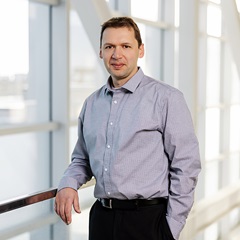2024 Research Excellence Award Recipient
This award is presented to APEGA members who have conducted innovative research in engineering or geoscience that has been successfully applied to improve economic and social well-being.
Dr. Leonid Belostotski, P.Eng.

When he was a young boy, professional engineer Dr. Leonid Belostotski assembled circuit boards in his bedroom, using his imagination—and his mom’s nail polish—to bring his designs to life. Today, his research is at the forefront of radio frequency and low-noise receiver development. By pioneering new ways to reduce unwanted noise from agitated electrons, he’s helping humanity explore new frontiers in science, boost quantum computer capabilities, and create faster wireless signals.
A professor of electrical and software engineering at the University of Calgary’s Schulich School of Engineering, Dr. Belostotski holds the Canada Research Chair in High-Sensitivity Radiometers and Receivers. For more than 20 years, he’s been part of an international scientific consortium developing the world’s largest radio telescope. The Square Kilometre Array, now under construction in South Africa and Australia, will scan the cosmos to unravel the mysteries of the universe.
As a PhD student, Dr. Belostotski had a breakthrough idea to use consumer-grade computer chip technology to build the array’s receivers. Using this conventional technology instead of more expensive processes, he built the world’s first ultra-low-noise circuit that runs at room temperature. Because it doesn’t need to be cooled cryogenically like other low-noise circuits, it uses far less power and is more economical to produce on a vast scale. This led to further innovations that are integral to other global sky-mapping projects, including the Canadian Hydrogen Observatory and Radio-transient Detector in Penticton.
“Developing integrated circuits is fascinating. It’s very neat to receive a tiny chip back from a semiconductor foundry that is capable of performing numerous, complex functions,” notes Dr. Belostotski.
In recent years, his work has expanded into the rapidly growing field of quantum computing, which uses quantum bits—known as qubits—to process information and solve problems too complex for classical computers. He is developing circuits that can function in extreme cold, which will help to dramatically increase the number of qubits possible in quantum systems, as well as unique circuits that have the potential to boost wireless data speed and volume, making connectivity more widely available even in remote and difficult-to-service areas.
Awards and Distinctions
- Schulich Research Excellence Award, University of Calgary (2023; 2015)
- Schulich Faculty Achievement Award for Teaching (2020)
- Achievement in Innovation Award, University of Calgary (2018)
- Outstanding Reviewer, Institute of Electrical and Electronics Engineers (2017)
- GREAT Supervisor Award, University of Calgary (2016)
- Outstanding Teaching Performance, University of Calgary (2012–2016)
Professional Affiliations and Activities
- Member, Institute for Quantum Science and Technology (2022–present)
- Editor-in-Chief, Solid-State Circuits Society Magazine, Institute of Electrical and Electronics Engineers (2021–present)
- Chair, IEEE Solid-State Circuits and Circuits and Systems Societies, Southern Alberta (2009–2013)
- Member, International Square Kilometre Array Radio Frequency Systems Task Force (2007–2010)
- Member, APEGA (1997–present)
- Member, Institute of Electrical and Electronics Engineers (1996–present)
